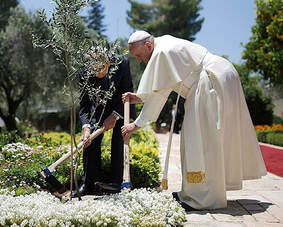The Catholic Church believes that all individuals have the responsibility to work for the common good of all humanity. The foundation for Catholic environmental concern is rooted in the Church's doctrine of the goodness of Creation and the Church's firm resolve to defend the dignity of each human being, especially the poor and vulnerable. The Catholic Church carries out its teaching and service on behalf of God's Earth and its people through an extensive network: parish churches, parochial schools, hospitals, religious orders and their communities, dioceses, archdioceses, state Catholic Conferences, and national Catholic organizations. Church leaders have called on Catholics to recognize environmental stewardship as their Christian responsibility and Catholic scholars have explored and developed these insights, showing how the message of environmental stewardship is rooted in Church teachings.
Leaders
Catholic Climate CovenantIn 2009, a Catholic coalition including the U.S. Conference of Catholic Bishops and a dozen other major institutions, launched the Catholic Climate Covenant to encourage Catholic individuals, parishes, schools and other organizations to pray, learn, assess, act and advocate on climate change in light of Catholic social and environmental teaching.
|
United States Conference of Catholic BishopsThe United States Conference of Catholic Bishops (USCCB), through their Committee on Justice, Peace, and Human Development, address environmental issues on the basis of the Church's social teaching. Their policy framework encompasses four priority areas: environmental justice, sustainable development, worker protection, and the common good.
Laudato Si' Advocates ProgramThe Laudato Si’ Advocates Program is an internship administered by the Environmental Justice Program in association with NRPE. The vision of the program is to inspire a generation of Catholic leaders who promote integral ecology through advocacy and witness.
To learn more, read the Advocates' blog and stay up to date with their Instagram! Those interested in applying for the 2024-2025 academic year can send an updated resume and completed application to [email protected]. |
Resources
|
Laudato Si'
Discover Catholic Teaching on Ecology
|
On June 18 2015, Pope Francis released an encyclical addressing the environmental crisis and it's deep interconnectedness to present social and economic injustices. Laudato Si' was welcomed by faith organizations and religious institutions worldwide and has inspired considerable movement in the Catholic community and beyond. Parishes, Catholic schools and businesses, dioceses, and other Catholic institutions, through the Laudato Si' Action Platform, have created and committed to action plans that take concrete steps towards a more ethical, environmentally conscience Church.
|
Laudate Deum
Francis' Update to Laudato Si'
On October 4, 2023, Pope Francis released an Apostolic Exhortation titled Laudate Deum. Laudate Deum is an unfortunately necessary and urgent reminder that collectively, our response to climate change and the environmental crisis since the release of his 2015 encyclical Laudato Si’ has not been strong enough. With an arguably unprecedented level of specific policy recommendations and a clear statement that our world’s actions and attitudes towards nature is indeed a “tragic and striking example of structural sin” (Laudate Deum, 3), Pope Francis models what it looks like for religious leaders to make bold, faithful, and direct statements about the need for cultural, political, economic, and spiritual transformation. He speaks to all faith communities as he encourages us to remember and reflect on the reality that “authentic faith not only gives strength to the human heart, but also transforms life, transfigures our goals and sheds light on our relationship to others and with creation as a whole” (61). Let us all join together on this “pilgrimage of reconciliation with the world” to which Pope Francis invites us, and work towards just, equitable, and bold environmental policies that prioritize the most vulnerable and take seriously the socio-economic dimensions of the problem set before us. For, as Pope Francis reminds us, “the world sings of an infinite Love: how can we fail to care for it?” (65)

